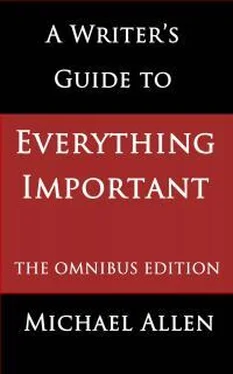Sheldon tried to negotiate. ‘Hold on a minute, Swifty,’ he said, in his most reasonable tones. ‘This isn’t a new book, it’s been out a few years. And I would never have bothered with it if my wife didn’t like it – so we’re not in a competitive situation here.’
‘I don’t need a competitive situation,’ said Swifty. ‘All I need is some jerk who wants to buy.’
1.2 What are the aims of this book?
This is the sixth book in my series of writer’s guides. All of them are intended to provide useful information for writers who are either young, or lacking experience in the publishing world, or both.
I am going to assume that most of the people reading this book are primarily interested in writing (and selling) full-length fiction.
However, some of what I have to say will definitely be of value to anyone planning a non-fiction book, particularly one aimed at the popular market (i.e. not a textbook or the results of ten years of academic research). But I shan’t have much to say which will be worth the time of playwrights (stage) or screenwriters (TV and film).
This book attempts to provide you with the bare minimum of knowledge which will help you to decide whether it would be a good idea to try to interest an agent in your work – or not.
And, in order to be realistic about trading conditions in the publishing world, I need also to show you how things can go badly wrong between a writer and an agent. I need to demonstrate to you that some agents are less than 100% honest; indeed some people, by declaring themselves to be agents, set out to steal money from you. And they quite often succeed.
If nothing else then, this book might help you to avoid wasting considerable sums of money.
More specifically, the aims of this book are as follows:
(i) To provide you with a short history of how agents first made their appearance, in the late nineteenth century, and how their role has changed and developed right up to the present day.
(ii) To provide you with examples of how relationships between agents and authors have sometimes gone badly wrong, to no one’s advantage, least of all that of the writers concerned.
(iii) And, finally, to show you that there are now more ways than one to make your work available to the reading public. By making use of such opportunities, you may eventually get to the point where it would be useful yo have an agent, if only to exploit to the maximum the success which you have earned without one.
My experience of publishing goes back a long way now (see section 1.3 below), and I have often noticed that young and inexperienced writers are usually very ambitious. But they are also – excuse me if I sound rude – lacking in basic knowledge about the book trade, and are naïve about the hard-nosed ways of businessmen. I certainly was, when I started out. The background aims of this book are therefore to provide such writers with enough information to prevent them (a) getting ripped off, and (b) wasting vast amounts of time and effort, and thus making themselves ill with frustration. And if you think those things couldn’t possibly happen to you, you’re wrong.
1.3 What makes the author of this book (Michael Allen) think he’s an expert?
When you are looking at a book that calls itself a writer’s guide to something or other, you may reasonably wonder just who the author of said book is, and what makes him any sort of an authority. All I can do to answer that is tell you a little of my personal history.
At the time of writing I am a couple of months short of my 75th birthday. I was first paid for writing an article in a weekly magazine in 1955. My first novel was published in 1963; since then I have written at least 25 other novels (under my own name and several pen names). At present I have about 60 ebooks on sale as Kindle ebooks, both fiction and non-fiction. These are published under various pen-names in addition to my own, and they vary in length from 100,000-word novels to single short stories. I have written about a dozen non-fiction books, most of them intended to be of help to writers.
See the Afterword to this book for links to my author pages on Amazon sites.
For about 25 years I was a director of two small publishing companies, and hence I have had experience of the book world from a publisher’s perspective as well as an author’s. For about ten years I was also the line manager of a small in-house printing unit, so I know about the technology of printing and book design. And I have, in my time, sold other people’s books to publishers, thus acting as an informal agent; though as the writers concerned were friends, I never charged any commission.
As far as my own agents are concerned, here is a brief history. In all, I have had dealings with half a dozen different firms (and their overseas associates) over a period of forty years.
After forty years, in 1999, I lost interest in traditional publishing and published my own books thereafter. Today I operate exclusively as an ‘indie’ or self-publisher through Amazon’s Kindle Direct Publishing facilities. Some, though not all, of my traditionally published novels have been reprinted as ebooks.
The English writer Ted Willis used to say that a writer should change his agent every seven years – otherwise you always remain the kid who wandered in off the street. And there is something in that.
For my part, I was dumped by an agent at least once. On another occasion, when I was with a big firm, the individual in that agency who looked after me resigned to start a business of his own; and I went with him. This is often done, but in this case the arrangement was not a success.
The final fifteen years of my connections with traditional publishing were dealt with very amicably through leading agencies in New York and London.
I am an Englishman, and most of my experience has been in UK publishing; but I have had extensive dealings with both American agents and publishers.
PART 2: A short history of literary agents
2.1 Early days
By the late nineteenth century it was obvious that there was quite a lot of money to be made in publishing. And writers were beginning to feel that they weren’t getting their fair share of it. In fact some of them suspected, with good reason, that they were simply being cheated. (Funnily enough, that attitude persists to this day.)
In 1895, for instance, it became known in London that a novel sold outright to a publisher for £500 had, in the following seventeen years, made a profit of £19,000; which would be a tidy sum even today. Writers weren’t happy about that sort of thing.
This general atmosphere of distrust between publishers and writers made it possible for a new breed of middlemen to step into the angry space between the disgruntled parties. Of course, writers had often had friends, fathers (particularly where ladies were involved), and occasionally lawyers, who had given writers a helping hand in the dealings with publishers. But now a specific type of sharp-eyed entrepreneur could see an opportunity for profit.
Literary scholars tell us that the term ‘literary agent’ was in use from the 1870s onwards, and by the 1890s the existence and function of such agents was well known in publishing.
In 1893, William Heinemann (a publisher) published an article in the magazine Athenaeum in which he said: ‘This is the age of the middleman. He is generally a parasite. He always flourishes…. He calls himself the literary agent.’
Heinemann was, in fact, referring to one particular individual: A.P. Watt; and the agency established by Watt is still in existence.
Watt seems to have been a forceful character, because by the time Heinemann was complaining about him, and any others of the same ilk, Watt was listing among his clients such famous names as Wilkie Collins, Arthur Conan Doyle, Thomas Hardy, and Rudyard Kipling.
Читать дальше












